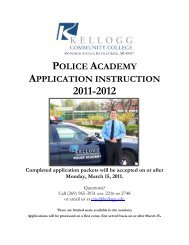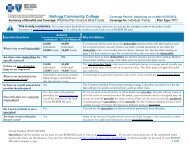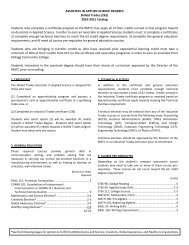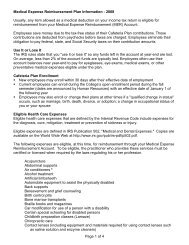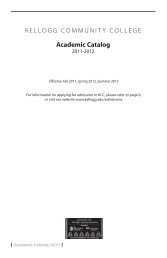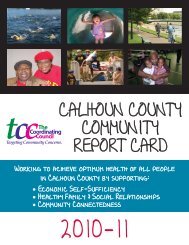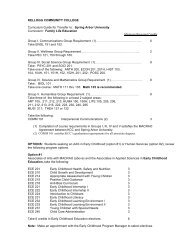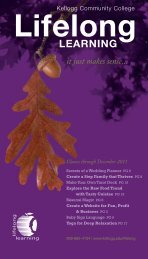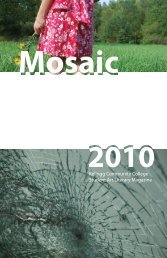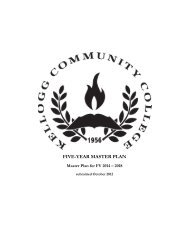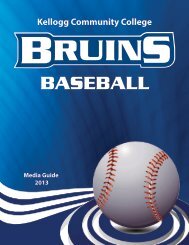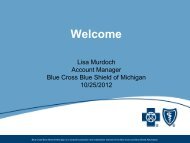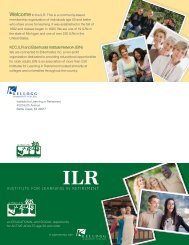Kellogg community college nursing student handbook
Kellogg community college nursing student handbook
Kellogg community college nursing student handbook
Create successful ePaper yourself
Turn your PDF publications into a flip-book with our unique Google optimized e-Paper software.
NURSING EDUCATION AT KCC<br />
Mission<br />
The <strong>nursing</strong> educational <strong>community</strong> shares in the mission of <strong>Kellogg</strong> Community College. By<br />
providing excellent educational experiences, we support scholarly endeavors for all individuals<br />
who have achieved admission to the various Nursing Programs. Our Nurse Educators serve as<br />
facilitators of the learning process, encouraging all <strong>student</strong>s to achieve their potential. As<br />
members of the academic <strong>community</strong>, <strong>student</strong>s are accountable partners in the learning process<br />
which incorporates evidence based practice, critical thinking, and life long learning. Students are<br />
prepared to practice as beginning nurse generalists to meet health care needs in a global society.<br />
We expect that every member of our academic <strong>community</strong> will adopt and enhance this mission.<br />
Philosophy<br />
The statement of philosophy expands on the mission of the <strong>nursing</strong> education <strong>community</strong> and<br />
further articulates beliefs that have been integrated throughout the curriculum. The philosophy of<br />
the <strong>Kellogg</strong> Community College Nursing Department evolves from beliefs regarding the <strong>student</strong>,<br />
<strong>nursing</strong> discipline, and <strong>nursing</strong> education to prepare the beginning nurse generalist to practice in<br />
a global and rapidly changing health care environment.<br />
Each <strong>student</strong> brings diverse attitudes, knowledge, skills, life experiences, learning needs and<br />
styles that require varied approaches to the learning process.<br />
Nursing is a dynamic discipline generated from a professional body of knowledge, skills, values,<br />
meanings and experiences. Through autonomous and collaborative decision making, the nurse<br />
applies the related core competencies of which include caring, communication, critical thinking,<br />
evidence based practice, and professionalism.<br />
Nursing education is research based; reflective of health care trends, incorporating innovation,<br />
technology, and creative instructional methods. Nurse Educators design <strong>student</strong>-centered,<br />
individualized learning experiences for diverse <strong>student</strong> populations. The role of the Nurse<br />
Educator is one of guiding, facilitating, and mentoring the learner to promote the value of life-longlearning<br />
within the <strong>nursing</strong> profession.<br />
Teaching Philosophy<br />
Learning is a growth process facilitated by a caring and collaborative relationship between<br />
educator and <strong>student</strong>. The <strong>nursing</strong> faculty believes that teaching is a dynamic process that<br />
integrates principles of adult learning. The <strong>nursing</strong> faculty incorporates a variety of evidencebased<br />
teaching strategies to accommodate various learning styles.<br />
The <strong>student</strong> should actively participate in the learning process, using experience and guidance<br />
offered by faculty; assuming responsibility for meeting learning outcomes, through the application<br />
of clinical reasoning into practice. The faculty create a sense of <strong>community</strong> within the classroom<br />
by providing a safe environment, role modeling, promoting effectual communication, professional<br />
behaviors, and by valuing the diversity and uniqueness of each individual.<br />
Page 5 of 46



